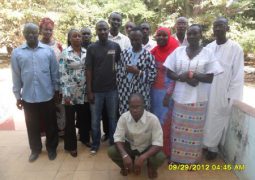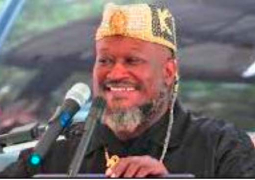Chief Inspector Ebrima Camara, attached to the KanifingPolice Intervention Unit (PIU), yesterday testified as the second prosecution witness (PW2) in the trial involving Ousainou Darboe, leader of the United Democratic Party (UDP), and nineteen others.
The other accused persons are Kemeseng Jammeh, Femi Peters, Lamin Dibba, Lamin Jatta, Yahya Bah, Babucarr Camara, Fakebba Colley, Ismaila Ceesay, Momodou Fatty, Dodou Ceesay, Samba Kinteh, Mamudou Manneh, Nfamara Kuyateh, Fanta Darboe, Lamin Njie, Juguna Suso, Momodou L.K. Sanneh and Yaya Jammeh and Masaneh Lalo Jawla.
When the case was called before Justice Eunice Dada of the Banjul High Court, the Director of Public Prosecutions (DPP) Hadi Saleh Barkun with a team of state counsel appeared for the state.
The accused persons were not represented.
In his testimony, Chief Inspector Camara told the court that he lives in Tallinding and knew one Musa Sanyang, deputy Superintendent of Police attached to the Kanifing PIU.
Asked by the DPP whether he recognised the accused persons, he said he could recognise some of them.
Officer Camara adduced that on Saturday 16 April 2016 between the hours of 11 a.m. and 12 noon, they were briefed to patrol at the Kairaba Avenue led by Musa Sanyang.
He said on their way to Kairaba Avenue, they saw a group of people, but did not stop there and decided to proceed to the Kairaba Police Station.
“We later got information that they were walking by foot, and we also boarded the truck and went there.We observed that a lot of people had closed their shops, traffic was also blocked, but we managed to find our way in front of them. After some meters, we dropped down from the truck and we formed a line.”
He said Mr Sanyang moved towards them and asked them for a permit, which they could not produce and he later read a proclamation, saying: “In the name of the President of the Islamic Republic of The Gambia all persons assembled here are ordered to disperse peacefully and go about their lawful businesses. Persons who do not disperse will be liable to disperse forcefully.”
He added that after the proclamation was read to them they insisted that they would proceed with their demonstration.
Chief Inspector Camara further told the court that stones started coming from the protesters, and Superintendent Sanyang told them to fire teargas at them.
Some people ran away and others were arrested; and the people who were arrested were taken to the Kanifing PIU Office and further police action was taken against them.
Earlier before the testimony of PW2, the DPP informed the court that the matter was slated for continuation of hearing.
However, he informed the court that at the last sitting he did not avert his mind on the issue of interpretation, because some of the accused persons used local languages when they were taking their plea.
“My application is to effect that and I want PW1 who was discharged be called to testify again for those who cannot speak English,” he said.
In her ruling, the trial judge said pursuant to section 123 of the Criminal Procedure Code, the application of the DPP was hereby granted and Musa Sanyang, the Deputy Superintendent of Police, was hereby called to testify and that “it shall be interpreted to the accused persons in a language they understand”.
At that juncture, the DPP was asked by the court what local languanges the accused persons could speak and he responded, saying they would be guided by the court’s records on the day they were arraigned.
After going through the records, Justice Dada said the accused persons took their pleas in English, Mandinka, Wollof and Fula when they were arraigned.
When the accused persons were asked by the court clerk as to who among them could understand Mandinka, Wollof and Fula, all of them did not respond to the clerk.
At that juncture, the matter was stood down for the court to bring a Wollof interpreter.
When the matter resumed, the DPP instead applied for the judge to read from her records and the interpreters interpreted it to the accused persons instead of the PW1 testifying again, which was granted by the court.
After interpreting the testimony of the first prosecution witness to the accused persons, the trial judge said having gone through this procedure, “the question is does the accused persons have any questions for the witness or whether they want to wait for their lawyers?”
“I have stated my position on 9 June 2016, and I wish to reiterate that I have absolutely no doubt that this proceeding has been done in such a way to accelerate our pre-arranged conviction,”
Ousainou Darboe said.
When other accused persons were asked one after the other as to whether they had any questions for PW1, each of them stood up and sat down without uttering a word to the court.
Justice Dada said the response of the accused persons from the first to the last had been recorded as silence.
At that juncture, the DPP applied for PW1 to be discharged, which was granted by the court.
Subsequently, the case was adjourned until 16 June 2016, at noon for continuation of the hearing.



